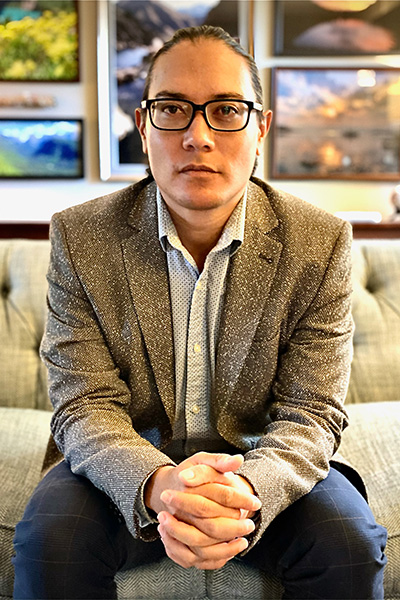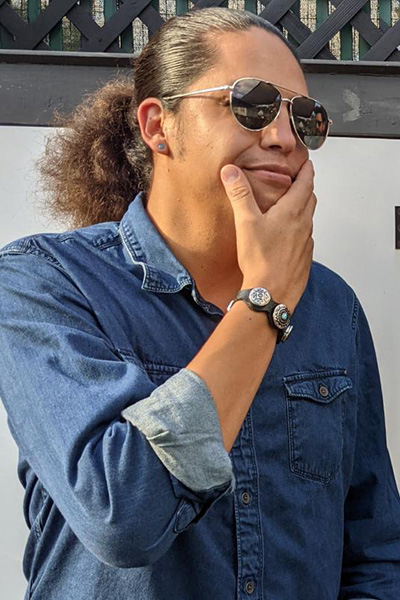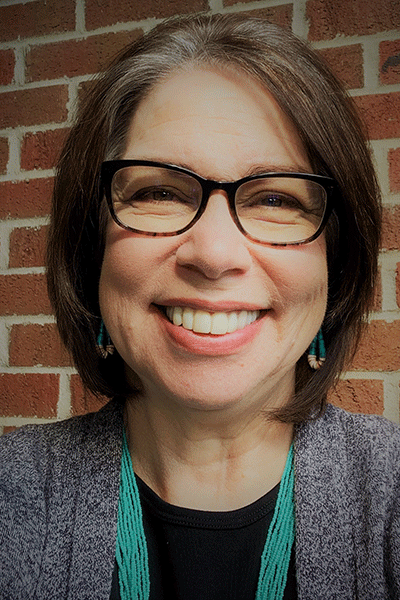10:30 a.m. – 11:30 a.m.
Wednesday, December 8, 2021
On Wednesday, December 8th the EDGE Office will host a virtual ‘coffee break’ panel to celebrate and honor Native American Heritage Month. For this discussion we have invited scholars of Native American and Indigenous heritage as well as those whose research centers American Indian communities and ways of knowing. Panelists Shannon Gonzales-Miller and Tim San Pedro will lead a discussion on the historical and current realities facing Native American students, staff, and faculty at institutions of higher education. Particular attention will be paid to the phenomenon of land acknowledgements, and ways that OSU can best support our Native American community members. We invite you to grab your coffee and join us for this virtual event.
Timothy San Pedro

Timothy San Pedro is an Associate Professor of Multicultural and Equity Studies at Ohio State University. He is Filipino-American and grew up on the Flathead Indian Reservation in Western Montana. His experiences there led him to focus his scholarship on the intricate link between motivation, engagement, and identity construction to curricula and pedagogical practices that re-center content and conversations upon Indigenous histories, perspectives, and literacies. San Pedro is an inaugural Gates Millennium Scholar, Cultivating New Voices Among Scholars of Color Fellow, Ford Fellow, Concha Delgado Gaitan Council of Anthropology in Education Presidential Fellow, and a Spencer Postdoctoral Fellow.
Gregorio Gonzales

Dr. Gregorio Gonzales, Ph.D. is Genízaro and Comanche from New Mexico. He currently teaches and writes as a Post-Doctoral Scholar in Indigenous Knowledges with the Department of Comparative Studies at The Ohio State University. Earning his doctorate in Sociocultural Anthropology from The University of Texas at Austin in 2017, Dr. Gonzales has been awarded fellowships with the Consortium for Faculty Diversity, the University of California President’s Postdoctoral Fellowship Program, the School for Advanced Research, the Institute for Critical Social Inquiry at the New School for Social Research, and the Smithsonian’s National Museum of the American Indian, among others. As an Indigenous anthropologist, educator, and researcher, his work has been featured in the Taos News magazine Raíces: Tradiciones, the New York Times, and on NPR’s All Things Considered–among others. His writings have also appeared in the American Indian Culture and Research Journal, New Mexico Magazine, Red Ink: An International Journal of Indigenous Literature, Art, & Humanities, and Trickster, among other forthcoming publications. Outside of the classroom, Dr. Gonzales continues his collaborative work with the Albuquerque-based national urban Indian nonprofit, Americans for Indian Opportunity.
Shannon Gonzales-Miller

Shannon Gonzales-Miller is a graduate and retiree of The Ohio State University. She earned her Ph.D. M.A. and B.S. from the College of Education and Human Ecology’s, Department of Teaching and Learning’s, Multicultural and Equity Studies in Education, Global Education and Social Studies Education Programs. Her research interest centers on distinguishing the experiences of Urban Indian/Native college-going students (the generations born in the city) from the enduring educational discourse that favors tribal-centric experiences of students. Her research project sought to examine what can be learned about culturally centered pedagogies from Urban Indian, college-going students when their Indigenous identities are overlooked or contested in academic learning spaces.
In addition, to her academic pursuit, Dr. Gonzales-Miller dedicated 30 years to working in the Office of Diversity and Inclusion as the Director of Scholarships and Grants where she provided support for the academic goals of students by echoing the resilience, courage and resolve she heard in the stories they shared.
Dr. Gonzales-Miller was born and raised in California but has lived most of her life in Columbus, Ohio where she and her husband raised their phenomenal daughter who is also a graduate of The Ohio State University. Her Native story is rooted in her lived experience as a direct descendant of a parent who along with his siblings were taken by state officials to live in an off-reservation, state funded, orphanage for his K-12 years of schooling. She considers her pursuit of a PhD a form of historical trauma response based on her understanding of the significance of remembering, reclaiming, and re-storying her Indigenous ways of knowing, being and becoming.

